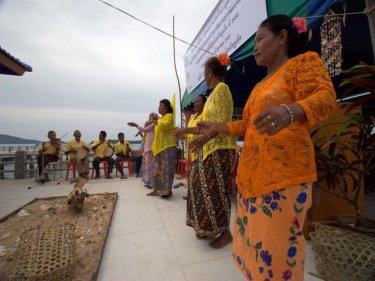A sea gypsy woman died on June 4, followed on June 9 by an 11-month-old boy who fed from the breast of a woman who ate the turtle, and a 60-year-old woman who died on June 11.
All were from the southern sea gypsy village of Rawai.
Others who ate the meat suffered food poisoning, but survived. About 80 people told investigators that they shared the turtle.
Dr Wannakiat Tubtimsang, Director of the Department of Marine and Coastal Resources, based at Cape Panwa, said he first learned of the deaths on June 10 when villagers came to the cape, which shares space with the Phuket Marine Biology Centre. Turtles are hatched and raised there, and injured turtles are helped to recover.
The villagers asked Dr Wannakiat for a live turtle to release. They believed that by freeing the turtle, their good fortune would be restored.
An investigation by the Public Health Department and Dr Wannakiat established that the victims had eaten the flesh of a Hawksbill turtle, a rare type that has unusual eating habits. Hawksbills eat sea sponges containing high concentrations of silica, as well as comb jellies and jellyfish.
''It appears the turtle was toxic,'' Dr Wannakiat said. ''We haven't had a case like it on Phuket before.''
Today at a seminar entitled 'Marine Biodiversity in Thailand: Challenges and Opportunities' at Phuket Royal City Hotel, Dr Wannakiat mentioned the case.
He said that the sea gypsies had been warned that some species of traditional fare could be dangerous because of changes in the feeding habits of marine creatures.
Dr Wannakiat gave the Rawai villagers a turtle to free. The villagers say they are not going to eat Hawksbill turtles in future.
The Hawksbill, named for its curved beak, is perhaps the rarest of five species that were once found in abundance off the coast of Phuket and the Andaman.
Sea gypsies, or morken, live a traditional lifestyle in several fishing villages around Phuket and along the Andaman coast. Most have adapted to life on the island or the mainland and are no longer as nomadic as their ancestors once were.
Some were able to escape the 2004 tsunami because they realised the reaction of their animals to the undersea earthquake that triggered the big wave meant it was time to move away from the coast.
At least one group of sea gypsies relocated from an island off Phang Nga to the mainland after the tsunami.
Anthropologists feared their lifestyle and traditions would be destroyed, but the villagers have thrived on improved access to schools and better health care, as well as involvement in local government.
Others remain fringe-dwellers, preferring to live a traditional life in isolation.
Latest A 19-year-old man freed last year after serving a term for a killing gunned down his ex girlfriend's new lover at a Phuket City petrol station.
Jilted Phuket Lover Killed a Second Time
Samui Crash: Survivor Tells of Nightmare in Water
Breaking News A survivor of the Samui Phangnan speedboat collision has told Phuketwan of the crash and the aftermath in the water. This man is responsible for marine safety.
Samui Crash: Survivor Tells of Nightmare in Water
Phuket Expat Sought as 'Naked Body' Suspect
Breaking News Police have released this drawing of a bearded expat man they want to question about the brutal murder of a bar hostess whose naked body was left in a bag by a roadside.
Phuket Expat Sought as 'Naked Body' Suspect
Phuket Boom: Time to Hit the 'Pause' Button
Phuketwan Interview To move forward sensibly, Phuket needs to slow down on everything except public transport, says the chairman of the Phuket Chamber of Commerce.
Phuket Boom: Time to Hit the 'Pause' Button





Not sure who I feel more sorry for! Talk about instant karma!
Posted by Antz Pantz on June 29, 2010 09:37